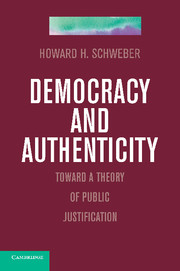Book contents
- Frontmatter
- Contents
- 1 Introduction
- Part One The Case for Constraint
- 2 Three Versions of the Case for Constraint
- 3 Subjective Standards and the Problem of Deliberative Perfectionism
- 4 Liberalism and the Problem of Authenticity
- 5 Further Reflections on Authenticity
- 6 The Scope of Constraint
- Part Two Responding to the Case for Inclusion
- Bibliography
- Index
- References
4 - Liberalism and the Problem of Authenticity
from Part One - The Case for Constraint
Published online by Cambridge University Press: 05 November 2011
- Frontmatter
- Contents
- 1 Introduction
- Part One The Case for Constraint
- 2 Three Versions of the Case for Constraint
- 3 Subjective Standards and the Problem of Deliberative Perfectionism
- 4 Liberalism and the Problem of Authenticity
- 5 Further Reflections on Authenticity
- 6 The Scope of Constraint
- Part Two Responding to the Case for Inclusion
- Bibliography
- Index
- References
Summary
The problem of combining a liberal theory of political discourse with appeals to authenticity is most commonly approached either by redefining authenticity or reconceiving liberalism. In the first approach, the solution appears to be simply assuming the existence of a shared authenticity sufficient to ground a case for constraint. One example of this approach is the assertion that as a matter of empirical and historical fact, we are all cosmopolitans, capable of drawing freely from a wide range of different sources in the expression of our authentic identities. Such an assertion can be made either descriptively or prescriptively. If the assertion is intended prescriptively, as a guide for political conduct that citizens are expected to find persuasive, then it implies a deeply perfectionist program. What, after all, is the response to the citizen who insists that he does not conceive of himself as a self-created cosmopolitan? To assert that all speakers should be aware of their own authentic liberalism is to tell the dissenter that he is simply wrong about the nature of his own subjectivity. Insisting that citizens are cosmopolitans in the face of their contrary subjective experience moves us into the realm of false consciousness. This is the violence of the constative that emerges when a subjective standard is married to a pervasive perfectionism. The attempt to combine a liberal case for constraint with the politics of authenticity by an assertion about the “true” nature of others’ authentic identities cannot be a satisfactory basis for a liberal theory of public reason.
If the proposition is presented descriptively, it “solves” the problem of pluralism by denying its existence. The whole point of acknowledging the fact of deep pluralism as a challenge for democracy is to recognize that any theory that posits universal agreement on moral and political questions as its starting point is neither useful nor particularly interesting as a response to the conditions of modernity. A case for constraint that begins by assuming that all citizens agree with the desirability of a case for constraint is not an argument; it is either an exercise in utopianism or a profoundly dystopian prediction about the future of liberal democracy. The utopian, prescriptive version of the exercise is one that justifies a case for constraints by presuming that everyone already supports them, so that no persuasion is necessary. The utopian version thus combines authenticity with perfectionism by first defining a single ideal model of subjectivity that is required of moral agents fit for citizenship, and then making it the business of the perfectionist state to inculcate that model of subjectivity in all its citizens. The dystopian version begins with the same assumption that the success of liberal democracy depends on universally shared desirable forms of subjectivity, but then combines that assumption with a deep commitment to neutralism. The result is a descriptive statement of the conditions of possibility for liberal democracy that becomes dystopic when it is combined with the stark unlikelihood of those conditions existing in reality. In that case, the prospects for liberalism as a set of principles capable of resolving the challenge of deep pluralism are dim indeed.
- Type
- Chapter
- Information
- Democracy and AuthenticityToward a Theory of Public Justification, pp. 95 - 129Publisher: Cambridge University PressPrint publication year: 2011



